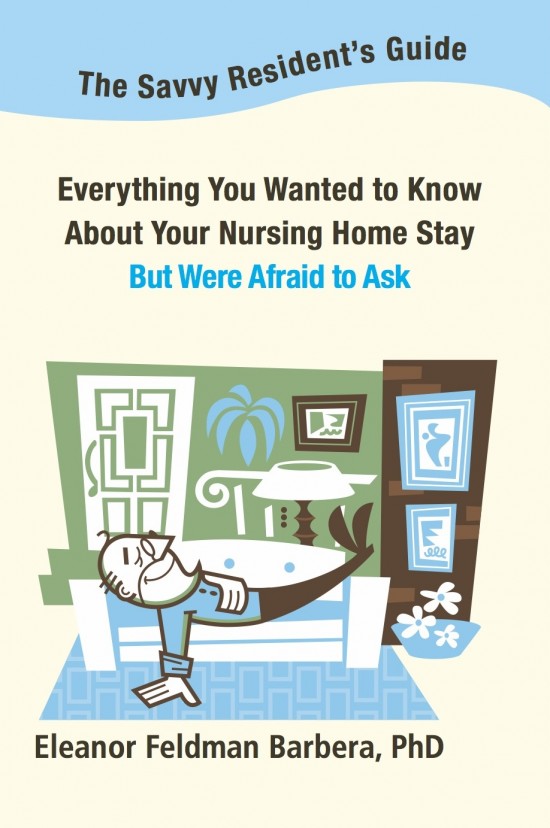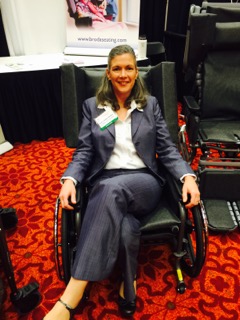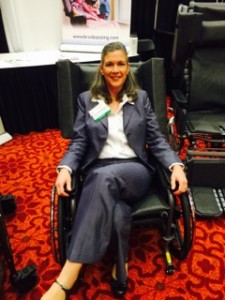Category: Personal Reflections
Posted by Dr. El - November 22, 2016 - Communication, McKnight's Long-Term Care News, Personal Reflections, Resident education/Support groups, Stress/Crisis management

Here’s my latest article on McKnight’s Long-Term Care News:

The 2016 presidential election has revealed a deep rift in our country, and quite possibly in our long-term care facilities as well.
While some employees and residents are pleased about the election results, it’s likely that others in your community are considerable less so.
An informal survey of my fellow geropsychologists revealed the following situations occurring in their nursing homes:
• Staff arguments regarding politics.
• Anger in residents, some of whom are misdirecting their anger.
• Residents and staff members who are dismayed, distraught or depressed regarding the election results and the direction of the country.
• Residents reporting that staff members told them they voted for Trump but asked them to keep this secret because they don’t want their Clinton-supporting coworkers to know.
• Staff who openly voted for and are discussing their Trump votes with clients as a point of pride, without recognizing the impact on their disabled clients after Trump’s mocking of a disabled person.
• Transgender residents concerned they are going to be “outed” and will be refused the medication they’ve been taking for years to maintain their health.
• Aides and other staff (housekeeping, kitchen workers) crying in staff lounges out of fear that some of their family members might be deported and that they, too, would have to return to their country of origin because they wouldn’t be able to afford to stay here on their own. As they shared their fears with their respective residents, the possibility that their beloved aide might leave them added to the anxiety the resident might have already felt about the election results.
• Staff concerned about their jobs and the future of healthcare; residents fearful they will no longer be eligible for Medicaid if the laws change.
Certainly not every facility is experiencing such reactions — a psychologist working in a VA home indicated that the veterans seemed generally positive about the prospect of President Trump.
Another psychologist reported that a Romanian Holocaust survivor was pleased with Trump’s win because he’d feared the country was moving toward a socialist model he’d unhappily lived through previously.
With our diverse population of residents and staff members, however, it’s likely there are at least some people in our communities who are experiencing distress and would benefit from reassurance and support from those in charge.
Here are 6 ways to accomplish this:
1. If you haven’t already done so, send a memo requesting that staff members refrain from discussing politics, especially in front of residents.
2. Reiterate to staff members the corporate policies regarding discrimination and express a commitment to a fair and bias-free environment.
For the entire article, visit:

Posted by Dr. El - November 5, 2016 - Inspiration, Personal Reflections, Savvy Guide reviews, Something Good About Nursing Homes


The theologian, Paul Tillich, once said, “The first duty of love is to listen.”
This quote came to my mind when I read the kind review of my book, “The Savvy Resident’s Guide,” by Yang of CNAEdge. It feels good to be heard. In return, I want to thank Yang and his colleagues, Alice and May, all current or former Certified Nurse Assistants, for their powerful work and writing. These courageous individuals write “from the front lines” of caring for the elderly, and I’m deeply moved by the honesty and vulnerability in their work.
In writing my book, “The Savvy Resident’s Guide,” I wanted to give new residents a road map to life in a nursing home. I developed the book through years of listening to residents — their fears, worries, happy moments, and everything in between. As staff in long-term care, we can get rushed in the demands of schedules, paperwork, and other top-down regulations.
Yet we began our careers motivated by the fact that every resident is a person first. It means a lot to me that Yang, a former Certified Nurse Assistant (CNA) for over 25 years, found my book to be an encouraging reminder of this. He wrote:
“There is very little in The Savvy Resident’s Guide that could be considered new information for experienced caregivers. But in a way, for us at least, that’s the point. These issues are so woven into the fabric of our work experience that they become second nature to us and sometimes we lose sight of the fact that what might be obvious to us might not be as clear to someone else….the book helps us step into the new resident’s shoes because it reminds us of when we as caregivers were new to the system. The whirl of faces and personalities, the jargon, the strange cultural norms and customs of the facility and care unit, were all things we had to adjust to. Now, with a little imagination, we can put ourselves in the place someone who might not be feeling well to start, who perhaps has gone through a sustained period of loss and now has to adjust to this strange new world. Our empathy can begin even before the resident enters the front door.”
Every day I work with long-term care professionals who fulfill the first duty of love with their residents. Together we are bringing warmth and compassion to eldercare. I’m grateful to be in the company of the of CNAEdge and so many other thoughtful LTC workers. Thank you!

Posted by Dr. El - August 16, 2016 - Communication, Inspiration, McKnight's Long-Term Care News, Personal Reflections, Something Good About Nursing Homes

Here’s my latest article on McKnight’s Long-Term Care News:

I’ve learned a lot from listening to residents over the years, but it’s rare that I request specific advice. This month, I decided to change that.
In private conversations, I told residents that I was writing an article on advice from elders about how to live life and I asked them if they had any wisdom they wanted to share with young people.
Their responses were immediate and enthusiastic, as if they’d been waiting for someone to ask. They were so pleased with the question that I decided to ask my own elder relatives for their opinions as well. One family member, inspired by the inquiry, called to contribute further advice after her initial offering.
Many of the comments focused on wellbeing and taking risks in life:
• “If there’s something you want to do, go for it. Even if it doesn’t work out, at least you tried.”
• “Do what you can while you can do it. Take a chance!”
• “Do things you enjoy and keep as busy as your health will allow.”
• “Don’t overdo it.”
Others centered on maintaining independence:
• “Do the best you can and save a dime, because now when they jump me for money, I got a little something to pull out.”
• “Try to have something of your own, not your mother’s, not your father’s.”
Several people offered relationship advice:
• “Pay attention to your spouse but be an individual too.”
For the entire article, visit:

![]()
Posted by Dr. El - July 28, 2016 - Anecdotes, Depression/Mental illness/Substance Abuse, Personal Reflections, Role of psychologists

When psychologists provide direct care services to long-term care residents, a note is required for every session, documenting symptoms, therapeutic interventions and other information proving that each and every session is medically necessary. The goals and progress of treatment are reviewed every three months. Audits and case reviews by insurers are not uncommon. Other disciplines in the organization read the notes and can incorporate the work into their efforts or, occasionally, question why the resident is being seen.
Sometimes, particularly when I haven’t had a vacation for a while, I wonder if I’m being truly helpful. I don’t want to discontinue treatment too soon because often mine is the only consistent, deep contact a resident has in life, but the steady drumbeat of needing to prove it’s worth it can lead to doubts at times.
Luckily, my residents have a way of letting me know that my services make a difference to them.
I was considering discontinuing treatment with a somewhat confused woman. When I woke her from a nap the other day, she smiled broadly, pointed to my business card which she keeps by her nightstand and almost leaped out of bed to talk to me. She spent the session following up on topics we’d been addressing in previous sessions and proudly showing me her progress on activities in which I’d encouraged her to engage.
I’ll keep going with her a while longer.
Another resident approached me in the hall recently, saying he’d been waiting for me and telling me, “You give me a reason to live.”
I’d consider that medically necessary, wouldn’t you?

Posted by Dr. El - February 25, 2016 - Anecdotes, Common Nursing Home Problems and How Psychologists Can Solve Them, Personal Reflections, Role of psychologists


Like many of my residents over the years, Virginia had been a nursing assistant prior to her retirement. In our early sessions, I encouraged her to discuss how it felt to be “on the other side of the stethoscope,” as I put it, but she was too focused on the plot to steal her home.
I spoke to her social worker about it. “I’m not sure if Virginia is going to benefit from therapy because she’s pretty confused, but is there any reality to her worry about her house?”
Her social worker sighed. “I was hoping when she first got here that she could go home, but her daughter is selling her house so that’s not going to happen.”
I could see how that could be interpreted as theft.
I kept meeting with Virginia, making mental notes on how much time in each session was spent on agitated theories versus reasonable discussion of confirmable events. I met her comments about plots with empathy and redirection; I greeted her reports on attending activities with enthusiasm. Our early meetings were about 90% agitation and 10% reality, then 80/20, then 70/30. We were making progress.
A minor health crisis proved mentally beneficial. We discussed her doctor’s recommendations, things she could do to take care of herself and what to expect when she went to the hospital for her medical procedure. The conversation was now 80% reality.
The week after her return from the hospital, she expressed concern about her roommate. “Tell them to check her for a rash. I thought I noticed something last night.”
They checked. There was nothing. But Virginia the nursing assistant was back.
Posted by Dr. El - February 11, 2016 - Anecdotes, Common Nursing Home Problems and How Psychologists Can Solve Them, Personal Reflections, Role of psychologists

 The first time I met 87-year old Virginia, it was immediately apparent why the nurses had made the referral. She spoke too quickly, words pouring out one after the other without pause. She had vague theories that a staff member was trying to steal the house she’d vacated a few months ago and attempting to steal her boyfriend as well. She couldn’t identify which staff member it was, nor could she recall what day it was or the name of the United States president. “He’s got a wife and two kids, I remember that much,” she told me.
The first time I met 87-year old Virginia, it was immediately apparent why the nurses had made the referral. She spoke too quickly, words pouring out one after the other without pause. She had vague theories that a staff member was trying to steal the house she’d vacated a few months ago and attempting to steal her boyfriend as well. She couldn’t identify which staff member it was, nor could she recall what day it was or the name of the United States president. “He’s got a wife and two kids, I remember that much,” she told me.
Her gray hair was orange at the ends, giving her an unfortunate clown-like air; the flowers on her hat emphasized this effect. Her fingernails had been painted red weeks ago with only small bits of color remaining. She lifted up her floral shirt despite my protests to show me that she had no bra in her clothing collection.
“Do you think I’m crazy?” she asked with concern at the end of the interview.
“I think you’ve got a lot going on,” I demurred, “and I’d be happy to try to help you sort it out.”
“I wish you would,” she replied, satisfied.
Posted by Dr. El - January 11, 2016 - Anecdotes, Personal Reflections

As I was rushing past the nursing station, Sophia, a 93-year old woman wearing a red velour sweatsuit, was sobbing and calling out for help. She was sitting among a row of other residents who were watching television and passersby.
 “What’s the matter?” I asked, stopping to kneel by her wheelchair.
“What’s the matter?” I asked, stopping to kneel by her wheelchair.
“I want someone to put me
back to bed,” Sophia replied. “I’m so tired.”
“I’ll find someone to help you,” I reassured her. “It might take a little while, but someone will put you back to bed.”
I looked up, scanning the area for an aide or nurse. My eyes met those of a 30-something uniformed delivery man waiting for the elevator. “I bet you must run out of here at night,” he commented. His hardened voice held fear and disgust.
“Actually,” I told him matter-of-factly, “I like it a lot.”
With that, his face relaxed and his tone softened. “I’m really glad to hear that,” he said, sounding relieved. He looked around the room with what seemed to be a new perspective on the situation. The elevator doors opened. “Have a good day!” he called out, smiling.
I found the charge nurse and let her know about Sophia’s need to get back to bed. When I came back to the nursing station again a little while later, Sophia had returned to her room.
Posted by Dr. El - November 23, 2015 - Anecdotes, Inspiration, Personal Reflections, Role of psychologists, Something Good About Nursing Homes

Here’s my latest article on McKnight’s Long-Term Care News:

At a conference last week, I remarked to my audience of recreation therapists, “None of us went into this field for the money — we did it for the juice.” And by “the juice,” I mean the good feeling we get from helping seniors and the nice things they say to us in return.
This is why your employees stay, despite everything else.
To get us in the spirit of gratitude for Thanksgiving, I’ve included a sample of comments made by residents to their psychologists. (I solicited material from my colleagues in my favorite shrinky organization, Psychologists in Long-Term Care. I actually heard some of them at work myself, but I’m not gonna tell you which ones.)
• “Without you, I’m like a ship without a rudder.”
• “Girl, I am so happy to see you. I love your smiling face. You help me so much when you come. I don’t feel so crazy.”
• “Thank you for listening to me & not giving up on me.” (Written on a “Wow!” card.)
• “I know you understand. I’m not crazy, but sometimes I feel like I am. My family doesn’t get it and the girls here don’t have time to talk to me.” (LTC Alzheimer’s resident with pain issues.)
• “You help me to look at my life here in a way that my family, friends, and nursing staff can’t.”
• “You don’t know how much it helps to have someone come in and listen and talk to me! I’ve just felt lost. I know I forget things, but since you’ve been coming, it seems like I’m less befuddled!” (LTC resident with early onset Alzheimer’s disease.)
For the entire article, visit:

Posted by Dr. El - October 14, 2015 - Anecdotes, For Fun, McKnight's Long-Term Care News, Personal Reflections, Role of psychologists

Here’s my latest article on McKnight’s Long-Term Care News:

“The Adventures of
The Geropsychologist!”
Starring Dr. El as
The Geropsychologist!
There have been thousands of movies and TV shows about the exciting work of cops, lawyers, and hospitals, but long-term care? Fuhgeddaboutit!
Here, Dr. El aims to correct that oversight with a show that reveals the versatility and pragmatism of a nursing home psychologist willing to do what it takes to meet the needs of her residents.
Act 1, Scene 1
In today’s episode, Dr. El walks into 85-year old resident Frank Corolla’s nursing home room. His bed is neatly made and the curtain is drawn between his bed and his neighbor’s in their semi-private room. Mr. Corolla is sitting in his chair in his pajamas and bathrobe, listening to the radio.
Dr. El (in a loud voice): Hey, Mr. Corolla! It’s Dr. El. How are you doing today?
Mr. Corolla (looking sad): Not good.
Dr. El (sitting on the edge of the bed): What’s the matter?
Mr. Corolla: My eyes are hurting me so bad I was crying today.
Dr. El: Did that help?
Mr. Corolla: No.
Dr. El: I’m sorry to hear that. I’ll talk to the nurse. I’ll be right back.
Act 1, Scene 2
Dr. El appears at the nursing station and waits while the nurse finishes her phone call. The nurse hangs up.
Nurse: How are you, Dr. El? How can I help you?
Dr. El: Well, I’m good, thanks, but Mr. Corolla eyes are hurting him so badly he was crying today. I wrote a note for the doctor last week but I don’t see any follow up. Do you know what’s happening with that?
Nurse (looking in the computer): I don’t see anything from the doctor. I’ll call the nurse practitioner.
Dr. El: Thanks!
Act 1, Scene 3
Dr. El runs into the nurse in the stairwell.
Dr. El: Were you able to reach the nurse practitioner?
Nurse: Yes. She put in an order to see the ophthalmologist.
Dr. El: Awesome!
[Canned applause]
Act 2, Scene 1
Dr. El walks into Ms. Johnson’s room and finds her frantically rummaging through her closet with one hand. With the other, she holds on to the wall. She looks like she’s about to fall.
Dr. El: Ms. Johnson! Are you OK? What are you doing?
Ms. Johnson (looking up with tears in her eyes): I was looking for a shirt I wanted to wear and look how they do my things! All crammed in here like they was nothing! They’s something to me. They’s all I got.
For the entire article, visit:

Posted by Dr. El - August 18, 2015 - Inspiration, McKnight's Long-Term Care News, Personal Reflections, Resident care, Role of psychologists

Here’s my latest article on McKnight’s Long-Term Care News:

Last week, a New York Times article referred to the lack of training to prepare doctors to recognize the spiritual needs of their patients. Hospital physician Robert Klitzman, M.D., emphasized in the Well section article the value of meeting these needs.
Psychology graduate school also avoided focusing on clients’ spiritual needs, which were considered to be the province of those with formal religious training. Despite this, I’ve found that many of the conversations I have with residents can be considered spiritual work.
In the beginning of my LTC career, I quickly recognized that in order to be of service in this environment, I needed to come to a spiritual understanding of how such nice people could be dealing with such difficult illnesses. This led me to the book by Harold S. Kushner, “When Bad Things Happen to Good People.” The gist of the book, as I recall it, was that the question is not so much, “Why me, God?” but, “Why not me?”
That stance allows me to help people come to terms with their experiences and also to recognize very clearly that this could be me, or me down the road a few paces. I am merely assisting others as I hope someone will assist me when it’s my turn.
For the entire article, visit:














 The first time I met 87-year old Virginia, it was immediately apparent why the nurses had made the referral. She spoke too quickly, words pouring out one after the other without pause. She had vague theories that a staff member was trying to steal the house she’d vacated a few months ago and attempting to steal her boyfriend as well. She couldn’t identify which staff member it was, nor could she recall what day it was or the name of the United States president. “He’s got a wife and two kids, I remember that much,” she told me.
The first time I met 87-year old Virginia, it was immediately apparent why the nurses had made the referral. She spoke too quickly, words pouring out one after the other without pause. She had vague theories that a staff member was trying to steal the house she’d vacated a few months ago and attempting to steal her boyfriend as well. She couldn’t identify which staff member it was, nor could she recall what day it was or the name of the United States president. “He’s got a wife and two kids, I remember that much,” she told me. “What’s the matter?” I asked, stopping to kneel by her wheelchair.
“What’s the matter?” I asked, stopping to kneel by her wheelchair.



